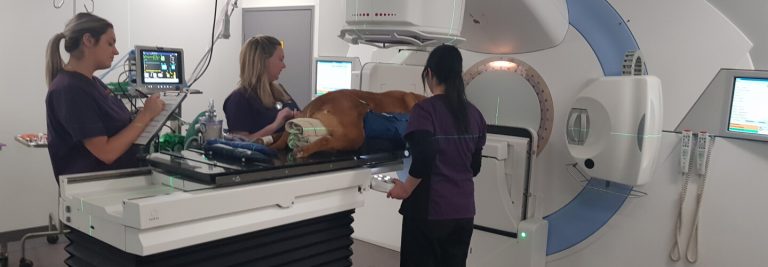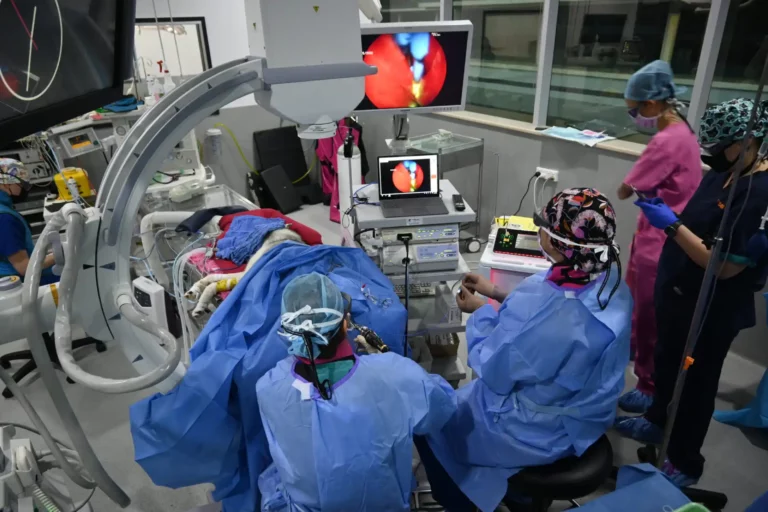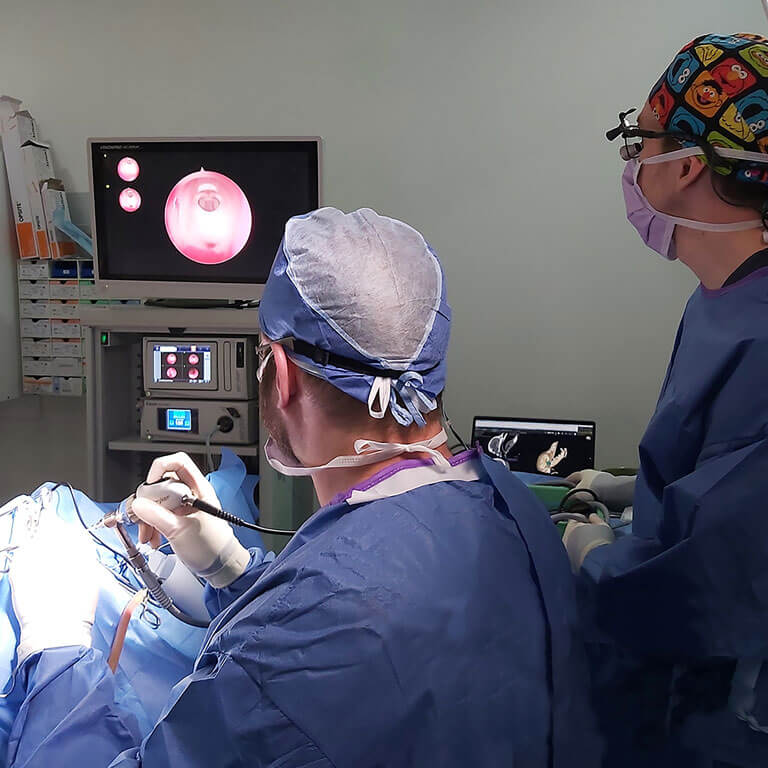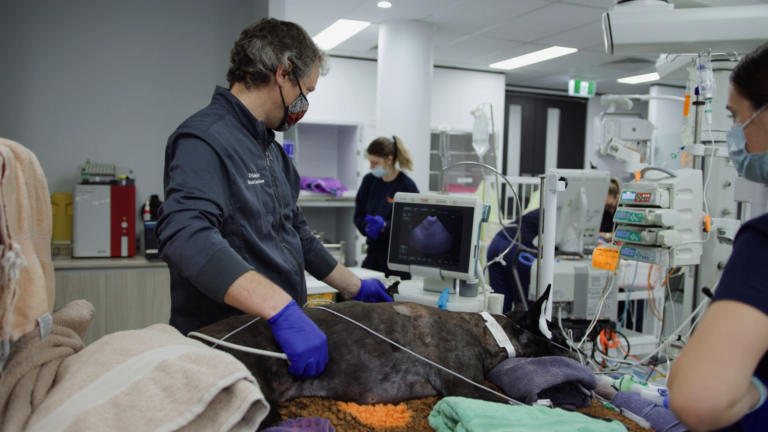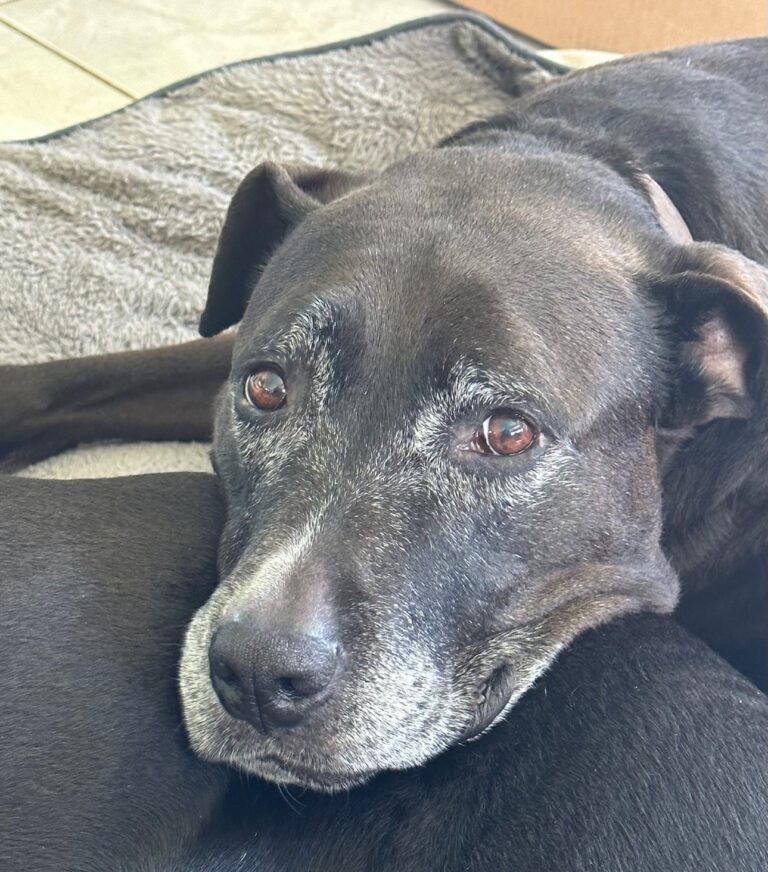Our Maisy will be 11 years old on 30 December. We will be celebrating her birthday like no other she has had. She was our first ever family dog and a precious rescue from the RSPCA. Maisy chose us. We were sent to the ‘wrong enclosure’ and shown a different dog to the one we had travelled down to collect. She was so sweet, quiet and incredibly friendly. When my husband bent down to pat her, she sat on her hind legs and put her front paws around his neck and said, ‘I’m coming home with you!’. We were torn. We felt as though we needed to take two dogs home that day, but knew we’d just have to leave with Maisy.
For the past ten and a half years, this princess has fiercely maintained her position as ‘the sixth human and fourth child of the household’, regularly reminding her younger brother, Ringo, that he is ‘just a dog’. (He gets plenty of love too!)
This time last year, Maisy’s existence was very different to now. She had greyed. She was slow. She tired easily and was uninterested in life. In short, she was struggling.
We put it down to reaching old age. She has a younger ‘brother’, Ringo. He is 4, has lots of energy and loves to try and be boss of the house (even though Maisy really is).
We had seen the transition of friend’s younger dogs becoming the ‘alpha’ dog as the older one in the household ages and thought this was what was happening for Maisy and Ringo.
It was time for Maisy’s annual check-up. I mentioned that her back legs seemed to be unusually weak, she was constantly panting, drinking a lot of water, had put on weight and was just plain tired. Maisy was given an arthritis injection, which we completed the course of and continued.
After a couple of months, we noticed that we just couldn’t keep the water bowl filled and realised Maisy had an even more insatiable thirst.
I was concerned with how much she was panting, but there had been high humidity and apparently many other dogs had been suffering with this, also. And being an older girl, we knew this was probably common in older dogs.
Fast forward to the day before ANZAC Day. (Doesn’t it always happen when we have a public holiday?!)
We took Maisy and Ringo for a drive; her favourite thing is to hang out the window and watch the world go by. We were out for about 45 minutes and noticed that for the last 10 minutes she was lying down and panting quite a lot. We got in the house, and she was lying on the tiles, unable to recover. The episode did not abate. Maisy’s breathing was very fast and laboured, her hair was standing on end and she was foaming at the mouth.
We took Maisy to a different emergency vet and while in the waiting room, Maisy was lying down and still not recovering. They took her in, examined her and then a vet invited us into the consultation room where she told us that Maisy’s liver and kidney enzymes were up, that she had an arrhythmia and it was quite likely that we may not be bringing her home. We were devastated.
At that point, I realised that the sick dread I’d felt for the past six months was warranted.
We rang the next morning to be told that Maisy’s kidney enzymes had improved, her liver enzymes were still high and that her arrhythmia was only intermittent but would need investigating. We collected her, with the instructions to take her back to have her blood checked at our local vet the next day. We did this and were told that her liver enzymes were still high, that it could be Cushing’s Disease and were hopeful that a pill every day for the rest of her life might fix the issue.
Thank goodness we have a great local vet that is caring, supportive and proactive. Long Jetty Vet made many calls on our behalf, finding the soonest appointment for Maisy to be seen by a specialist. They also spent time on the phone with us, giving time and care while monitoring and managing her symptoms.
Long Jetty assisted in helping us get an appointment at SASH North Ryde with the Cardiologist for an ECG and Echocardiogram (with Dr Iñaki Prado Checa) which was normal, a STIM test for Cushing’s Disease at SASH, Central (which was also normal), and an MRI at SASH North, which revealed a large adrenal mass that was growing onto kidney in one direction and travelling up her vena cava to her heart (and would reach her heart in the next couple of months if not removed).
Dr Sonia McGill, the Internal Medicine Specialist at SASH, Central Coast, spent over half an hour on the phone with me, an hour in consultation about what the options were for Maisy and further phone calls while we considered Maisy’s options. Sonia also spent time in consultation with a Specialist Surgeon and Radiologist at SASH, North Ryde, so that she could give us a comprehensive view of Maisy’s situation. Her empathy, care and proactive management of Maisy’s condition was reassuring.
We spent a lot of time and thought, considering Maisy’s situation. We had always said that Maisy needed pet insurance from the very beginning, because there was nothing we would not do if she needed help with her health.
We felt that the considerations went beyond just ‘using the insurance’.
What was best for Maisy? What did ‘doing whatever we could’ look like? And what was the right decision? How could we be the best stewards of Maisy’s precious life? And possible departure?
Thank goodness for the people who know!
After much discussion with SASH, we made the decision that radiation was a second choice (as it would only prolong her life a short amount of time and her quality of life would be limited). What would we do if she didn’t have radiation, though? We didn’t want Maisy to continue suffering, but also, we felt that Maisy wasn’t ready to say good-bye.
From there, we knew we needed to talk in more detail with Dr Tristram Bennett, Specialist Oncology Surgeon at North Ryde. He thought he could successfully remove the tumour. (This felt like a light in the dark for us at such a difficult time).
And it was a difficult time. Every day was centered around managing Maisy’s symptoms – with medication and care. We needed to manage her nausea, thirst and keep a constant eye on her (We made sure she always had someone with her for those six weeks and beyond).
My son and I drove Maisy down to North Ryde, to spend time in consultation with Tristram, while Facetiming my husband who was at home working. That day we made a friend. Someone who isn’t just a surgeon, he is a man who truly cares about animals and the people who love and steward them through their lives. Tristram was hopeful, as we were. He was realistic, covering all details – the risks, the possibilities and the reality of doing what we could for Maisy (including financial).
When Dr Tristram confirmed that either way, Maisy could be facing a possible major trauma if he operated. But that she would most probably be facing the same fate if we did nothing, it was confirmed to us that we should give Maisy her best fighting chance. We know our girl and we know she would want as much time with us here on this planet as she can possibly have. And our stewardship of her health means meeting our responsibility as pet parents, who made the decision to always do as much as we could, within our means, for her in a situation like this.
Dr Tristram promptly actioned the requirements for Maisy’s operation the following week. He reorganised medical team members’ schedules where required and cleared his whole day saying his whole day was, ‘all about Maisy’. And it really was! We drove her down the night before the operation and said our hopeful but heavy good-byes.
Dr Tristram rang us the night before and three times on the day of Maisy’s operation. In the morning. Just before the operation and after she was settled in ICU (in the middle of the room, in her own bed, with a pillow, a warm blanket, warm air blowing on her and someone with her 24/7). I said to my husband that I’m not sure a human in hospital gets that level of care!!
Dr Tristram gave us detailed information about Maisy’s operation, the outcome and the Team who also fell in love with Maisy. Apparently, during the operation, Dr Maja, the Anaesthetist said to Maisy, ‘You really want to live, don’t you!?’ Hearing these words meant so much to us, as we had felt this strong conviction of advocating for Maisy through the whole process. Maisy had needed a blood transfusion to cover what she had lost during the operation, but we knew this was quite probable.
Dr Tristram rang us three times the next day, with updates on Maisy, saying she was being such a wonderful patient, allowing the Team to do all they needed to for her. He also organised for other team members to phone and update us on the next day, while he wouldn’t be there.
During that week, Maisy’s younger brother, Ringo, donated blood at SASH, Tuggerah. This was to cover what was given to Maisy during her operation. We like to tell him he saved her life and two others. (He feels like a hero.)
On the Saturday, three days after Maisy’s operation, we travelled back down to SASH, North Ryde to pick Maisy up. It was such an emotional time. We were so happy to be bringing her home (still waiting for pathology results but knowing she was currently living her best possible outcome).
We walked into the reception area and were greeted by the brightest, smiliest, friendliest face I think I’ve ever experienced in any place I’ve visited. Jodie (Client Services) brought the most warmth and reassurance in a place where people are often at their limit of coping, while dealing with an unwell pet. We made another friend that day.
We waited patiently for Maisy to be brought out by Tristram. It’s hard to describe the anticipation and joy at such a vulnerable time. Again, Tristram gave us another hour of his time, going through Maisy’s journey with us and how we would walk her through the next few weeks and months, as she recovered.
And Maisy has recovered so incredibly well! Her pathology results showed that she needed no further treatment (with a follow-up scan in six months).
Today, I’m watching Maisy snooze on her bed. She’s taking calm, deep breaths and is clearly feeling very relaxed. This morning she ran to my bedroom door, snapping at the air, bossing me to feed her. She ran over to the lounge to insist that I let her up for cuddles. Her coat is shinier than it has been for years and she has her old, sleek figure back. She isn’t as strong as she used to be and her sometimes sore back legs need to be managed. This doesn’t stop her annoying her younger brother enough to make him wrestle her for a prized toy. Or having a swim in the pool, as she did the other day!
She is older. But she has life! Her eyes are bright and she clearly has every intention of staying with us for as long as possible.
We consider ourselves so blessed that Tristram and the Team at SASH have given Maisy the opportunity to grow old gracefully!
P.S. My word of advice, from this situation, is that you know your pet. And if something doesn’t feel right, ask for the tests. Investigate as soon as you notice something seems out of kilter. I now will not hesitate for a possible, annual blood test if that’s what feels like the right thing to do.
P.P.S. One very important initiative that became close to our hearts, during this time, was the wellbeing of our vets and staff caring for animals. The lurking reality of finances, decisions that pet owners are forced to make and the frequency of this (and the toll it puts on vet staff) is tough. There is no Medicare for animals, yet the treatment our Maisy received was the same level of care a human would receive. The cost of this needs to come from somewhere. This is the space that vets and their staff are often met with strain and stress. Sophie’s Legacy has become very dear to my heart, as a pet owner. And I will now always look for an opportunity to educate others about the importance of being kind to the people who look after our pets (our pets often get us through the hardest periods in our own lives!).
Remember that vets are looking after both pets and their owners!!
We also give many thanks to: Julia & Frances (Theatre Nurses), Dr Jeremy (Surgery Intern), Dr Alex Lai (Surgery Registrar), Dr Jo Whitney, Dr Lucy Fuchter & Dr Louis Eramanis (Critical Care) and Ilse & Anne (ICU nurses) who were part of the team looking after Maisy during her time at SASH.
